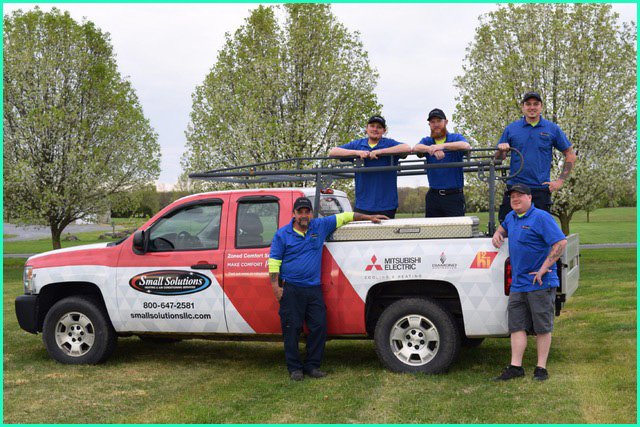HVAC installation and repair is a field of services that everyone uses but not everyone understands, especially when it comes to installing these systems.
Finding a company to work with that you feel comfortable asking questions, comparing options and understanding pricing is key. Every company is a bit different, so it’s good to check around with a few different HVAC installation contractors to see who you think is the best fit.
A great professional will be able to recommend different options depending on your situation, your utility expenses, the age of your home, your heating and cooling needs, etc. This is why it’s good to find someone you’re comfortable talking to, because there are dozens of possibilities. What might be ideal for your neighbor might be unnecessary expense for you, or vice versa. How do you go about getting a new heating and cooling system? If you’ve never done this before, certainly you may now know exactly where to start when researching, buying and getting new HVAC equipment installed. This can help.
- Start with researching contractors in your area (including us!). How many HVAC contractors are there in your area? Search Google and Google Reviews, professional directories, ask local friends for recommendations and compare several contractors for their credentials and reputation.
- Get estimates. Pick a few companies and reach out to them to schedule a consult and/or visit to your home to evaluate your needs and home situation. We generally recommend obtaining 3 estimates from different companies before making a major purchase, like a heating or cooling system. Going with the lowest price isn’t necessarily the right choice for every homeowner – it can be more expensive in the long run if there’s a mistake or misunderstanding. Make sure you know what you are getting for the price, like equipment and labor warranties, that could save money when or if repairs are needed.
- Schedule. Once you’ve decided on an HVAC installation contractor, it’s time to schedule it. Contact your chosen HVAC company to arrange a date. Remember that, depending on the season, your contractor may not be immediately available – summer and winter are usually busy times in the HVAC world.
4 useful questions to ask an HVAC technician before you hire someone:
- “How much experience do you have? ”Have they been working in the HVAC industry for a long time? Are they relatively new? Knowing how much experience an HVAC technician has can help you feel more comfortable about hiring them.In addition, consider asking how they learned their skills. If you have a specific brand or type of system, determine if they have experience with that as well.
- Can you provide references? Almost every HVAC technician will give you a written estimate explaining what work will be done and how much it will cost. However, it’s important to get references, too. Check online for reviews, too, like with Google Reviews.
- How do you deal with refunds, warranties and guarantees? Is your current system under warranty? If it’s past, can the new technician give you a new guarantee in writing? How do refunds work? You don’t have to be an expert on HVAC systems to find a good technician by asking some of these questions up front.
No…that’s an easy assumption but not true!
If you get a system that is too large, the HVAC system will heat or cool your home faster than an adequate sized system; however, it will operate in short cycles which causes the system to start and stop more frequently which results in a higher energy bill. On the other hand, if a system is too small, it will run continuously to try attaining the desired temperature which ultimately will also result in a higher energy bill. Overall, the best HVAC system for your home is based on your house’s square footage, age, layout and climate so that it can heat and cool your house without overworking your system.
The answer to this depends mostly on how well you maintain your unit with regular maintenance.
If you have the recommended service of your HVAC installation system performed throughout the lifespan of your system, a homeowner can generally expect their HVAC system to last anywhere from 15-20 years.
In general, these are more specific details on the average lifespan of various HVAC systems:
Heat Pumps: Average of 11-13 years
Air Conditioning Units: Average of 11-13 years
Furnaces: Average of 18-20 years
Tankless Water Heaters: Average of 20 years
Electric or Gas Water Heaters: Average of 10 years
Thermostats: Average of 15 years (however with the evolution of modern technology, it is recommended to update your thermostat sooner)
We recommend that you have your air conditioning system checked each spring and your heating system checked each fall. You can use the beginning and end of daylight saving time to help you remember to call for service.
AFUE stands for Annual Fuel Utilization Efficiency.
This rating measures the amount of heat a furnace produces compared to the amount of fuel consumed. For example, a furnace with an AFUE rating of 93 means that 93 percent of the fuel consumed will be converted to heat for your home while the remaining 7 percent will be lost to venting.
A great professional will be able to recommend different options depending on your situation, your utility expenses, the age of your home, your heating and cooling needs, etc. This is why it’s good to find someone you’re comfortable talking to, because there are dozens of possibilities. What might be ideal for your neighbor might be unnecessary expense for you, or vice versa.How do you go about getting a new heating and cooling system? If you’ve never done this before, certainly you may now know exactly where to start when researching, buying and getting new HVAC equipment installed. This can help.

At Small Solutions, we know it’s important to keep your home or business safe. With our dryer vent cleaning service, we help you to keep your dryer vent from becoming clogged up and becoming a potential risk. Our technicians clean both the inside and outside portions of the vent to ensure all dryer lint is removed.
A clean dryer vent can improve energy efficiency, allow clothes to dry more quickly, lower utility costs, and most importantly, helps prevent a potential fire in your home.
If you’re not sure if your dryer vent needs cleaning, here are some signs to watch out for that can help you to figure it out:
At Small Solutions, we know it’s important to keep your home or business safe. With our dryer vent cleaning service, we help you to keep your dryer vent from becoming clogged up and becoming a potential risk. Our technicians clean both the inside and outside portions of the vent to ensure all dryer lint is removed.


